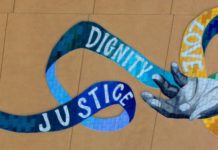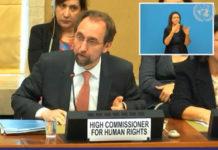UN to USA: Forced Treatment is Prohibited
The experience with the UN Working Group on Arbitrary Detention's visit to the US is a watershed for our work against forced psychiatry. Step by step, global and national advocacy support each other as part of a worldwide movement to abolish forced psychiatry using the UN human rights framework.
UN Expert Calls for Major Shift in Suicide Prevention Efforts on World Mental Health...
On World Mental Health Day, UN expert Dainius Pūras calls for a shift away from medical solutions toward a rights-based approach to make life “more liveable.” He calls for states to address societal determinants of mental health, promoting autonomy and resilience.
Berlin Manifesto for Humane Psychiatry Released
Changing the mental health and psychosocial support system in Germany requires public debate about the ways our society should help and support people in mental crisis and with chronic mental health problems. We believe the driving force behind all help and support should be humanitarianism and respect for inalienable human rights.
Evolution or Revolution? Why Western Psychiatry Won’t Change by Incremental Steps
...but how realistic is it to expect that the biological skew of Western psychiatry can be sustainably changed one small step at a time?
Humanizing Mental Healthcare by Reducing Coercive Practices
A review of the literature demonstrates that coercive practices lack empirical support and violate human rights.
How Would We Know If We Overthrew the Mental Health System?
What would it take to go about abolishing psychiatry? If we truly eliminated all the horrid practices that are currently committed by the mental health system, what would the world look like? What follows are 15 ways our society would need to change before we could be confident that we are free from the tyranny of the mental health system.
Psychiatric Diagnosis Can Lead to Epistemic Injustice, Researchers Claim
A discussion of the role of epistemic injustice in the experiences of patients diagnosed with psychiatric disorders.
Involuntary Hospitalization More Likely With Psychosis Diagnoses and Few Resources
New study links involuntary hospitalization with psychotic diagnosis, previous involuntary hospitalization, and economic deprivation.
Sociologist Questions Effectiveness and Ethics of Mental Health Services
Medical sociologist David Pilgrim argues that mental health care is neither effective nor “kindly,” as it often relies on flawed research and ineffective treatments.
United Nations Rep Brings Attention to Human Rights Violations in Psychiatry
Dr. Dainius Pūras argues that the status quo in mental health treatment is no longer acceptable and demands political action to promote human rights.
After the Black-Box: Majority of Children Starting SSRIs Still Receiving Too High of Dose
In 2004, the FDA added a black-box warning to SSRI antidepressants on the increased risk of suicide among children taking these drugs. A new study suggests that this warning has increased the proportion of children who begin an antidepressant on a low dose, but the majority are still receiving higher than recommended doses.
BPS Releases Review of Alternatives to Antipsychotics
BPS releases report encouraging behavioral interventions for people with dementia, rather than antipsychotics
Escaping from AOT: Letter to the Judge
To the judge presiding over my upcoming AOT hearing: I would like a better way to take care of my own health care than the choices currently being imposed on me by community mental health centers, which involve forcibly injecting me with a drug that I do not want and making me take a daily pill that I do not want to take. There is no reason that anyone should make my own health care choices for me.
Study Examines the Difficulty of Withdrawing from Antidepressant Drugs
Correcting unnecessary long-term antidepressant use is difficult and met with apprehension by providers and service-users.
UN Meeting on Human Rights in Mental Health: A Response
On May 14 and 15, the UN Office of the High Commissioner for Human Rights held a meeting on human rights in mental health. The event represented tensions in the United Nations between the promotion of mental health and the promotion of the human rights of people with psychosocial disabilities under the Convention on the Rights of Persons with Disabilities.
Refugees and Immigrants Experience Increased Medical Coercion
Refugees and first-generation immigrants of African descent are at greater risk of experiencing medical coercion when compared to immigrants of other visible minority communities in Canada.
The Mental Health Reform Act of 2016 (SB 2680) Would Be a Huge Step...
There is indeed a crisis in the mental health business. The crisis derives from psychiatry's spurious and self-serving premise that all significant problems of thinking, feeling, and/or behaving are brain illnesses that are correctable by psychiatric drugs.
72 Hour Hold for Inalienable Personhood
Poof! Medical science and brain specialists have just alienated your rights. Far be it from me to question expert judgment, but have any of these people ever considered how dangerous it is to abrogate someone's personhood? It's time to recognize inalienable personhood. Social 'othering' is deadly.
To Live and (Almost) Die in L.A.: A Survivor’s Tale
After 25 years of chronic emergency, 22 mental hospitalizations, a stint at a “community mental health center,” 13 years in a "board & care," repeated withdrawals from addictions to legal drugs, and a 12-year marriage, I plan to live every last breath out as a survivor, an advocate, and an artist.
Patients with OCD Prefer Psychotherapy
A new study in Psychiatric Services examines patient preferences for the myriad treatments available for Obsessive-compulsive disorder (OCD)
Feral Psychiatry: More on the Garth Daniels Case
On Wednesday, May 18th, Daniels had what was probably his 102nd consecutive episode of ECT. As always, he told the staff that he did not want it and did not consent to it; as always, he got it. Later on the next afternoon, Garth left to join his family in Brisbane. None of us have a crystal ball but his position now seems much better than at any stage in the past. Let's look at some of the facts and opinions surrounding this case.
Study Finds High Risk for Suicide Following Psychiatric Hospitalization
Patients are at an increased risk for suicide during the three months immediately following discharge from an inpatient psychiatric hospital.
FDA Defends Decision to Approve Digital Aripiprazole
Members of the U.S. Food and Drug Administration’s Psychiatry Products division go on the defensive in a new article, responding to concerns about the agency’s approval of digital aripiprazole.
Coercion in Care
To this day I do not know how I found my way back. I think it might’ve had something to do with willpower, as I was NOT going to lose myself. I was NOT going to end up like those people who were living indefinitely in the hospital—those “chronic schizophrenics”, as they say. I was going to find my way back, back to myself.
Forced-Treatment Advocacy Group Cherry-Picks Data to Support Agenda (Again)
Did the Treatment Advocacy Center actually uncover research proving that poor psychiatric medication adherence plays a "significant" role in whether people diagnosed with schizophrenia become violent? If such research does exist, is it as compelling as TAC described?






























